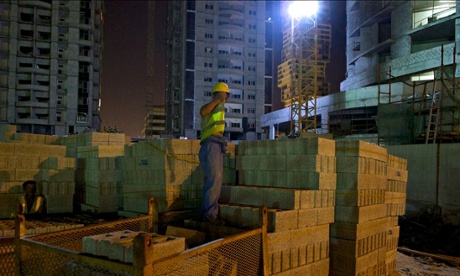La Corea del Nord schiavizza i suoi migranti: sottratto il 90% dei salari ai coreani che operano in Qatar.
L’inchiesta è del Guardian del 7.11.14:
North Koreans working as ‘state-sponsored slaves’ in Qatar
Defectors claim Pyongyang regime pockets 90% or more of earnings made by migrants working on construction sites in Qatar, where preparations are under way for 2022 World Cup
Pete Peterson in Doha
The Guardian Friday 7 November
Thousands of migrant labourers from North Korea are toiling for years on construction sites in Qatar for virtually no pay – including on the vast new metropolis that is the centrepiece of the World Cup – in what may amount to “state-sponsored slavery”.
According to testimonies from workers and defectors, labourers from the reclusive state said they receive almost no salaries in person while in the Gulf emirate during the three years they typically spend there.
They work in the expectation they will collect their earnings when they return to North Korea, but according to a series of testimonies from defectors and experts, workers receive as little as 10% of their salaries when they go home, and some may receive nothing. One North Korean worker at a construction site in central Doha told the Guardian: “We are here to earn foreign currency for our nation.”
The North Korean regime, led by Kim Jong-un, is currently subject to international sanctions as it continues to defy calls to end its nuclear programme and address severe human rights abuses. A recent UN report accused the regime of crimes against humanity. The foreign currency earned by its overseas workforce is a crucial tool for propping up the isolated country’s fragile economy.
In the sprawling construction zone that will eventually become Qatar’s gleaming $45bn (£28bn) Lusail City, where the 2022 World Cup final will be held, four construction sites are said to be using North Korean workers, although there is no suggestion they are involved in building World Cup stadiums.
On one site, North Koreans battled biting desert sands and searing heat to construct a luxury residential tower. They laboured on as day turned to night, long after workers from other nationalities had left the site.
One North Korean worker helping to build the high-rise said: “People like us don’t usually get paid. The money does not come to the person directly. It’s nothing to do with me, it’s the [North Korean recruitment] company’s business.”
A project manager of the lavish development said the workers “don’t have a single rial themselves” and “borrow money from us if they need small things like cigarettes”.
“The descriptions of the conditions North Korean workers endure in Qatar – abuse of vulnerability, withholding of wages and excessive overtime – are highly indicative of state-sponsored trafficking for forced labour,” a modern form of slavery, said Aidan McQuade, the director of Anti-Slavery International.
Sources in Qatar estimate there may be as many as 3,000 North Koreans working on projects across the emirate. They are part of an army of workers the North Korean regime exports around the world to bring in much-needed foreign currency. According to defectors’ groups, there may be as many as 65,000 North Koreans abroad, mainly working in Russia, China, Mongolia and the Middle East.
Kim Joo-il, a former army officer who escaped North Korea in 2005, estimates that the Pyongyang government typically takes 70% of the total salary of workers abroad, and that after all “fees”, notionally for food and accommodation, have been paid, workers will be left with only 10% of their salary.
According to a report by the North Korea Strategy Centre, a defector-run organisation based in South Korea: “Almost all of the wages of the workers sent abroad are remitted back to Kim Jong-un’s regime … in very extreme cases, the workers are allowed to have 10% of their wages.”
Two employees of state-run North Korean recruitment firms operating in Qatar admitted that their workers do not receive their salaries in person, but insisted a proportion of their wages are sent back to the workers’ families in North Korea.
Earlier this year, in its annual Trafficking in Persons report, the US state department criticised the treatment of foreign workers sent to earn foreign currency by the regime. It said that many North Korean Workers were subject to forced labour, their movements and communications conducted under surveillance, and that they face threats of government reprisals if they attempt to escape or complain. “Workers’ salaries are deposited into accounts controlled by the North Korean government, which keeps most of the money … workers only receive a fraction of the money paid to the North Korean government for their work,” the report said.
Qatar’s treatment of its migrant labourers has come under increasing scrutiny as it gears up for the 2022 World Cup, following a Guardian report last year that revealed widespread deaths and abuse among migrant workers. In May 2014 the emirate announced a series of reforms to improve their living and working conditions.
A spokesperson from the ministry of labour and social affairs said: “We take all issues around worker payment extremely seriously. There are currently 2,800 North Korean guest workers registered in Qatar and we have no recorded complaints about their payment or treatment. Qatar is determined to continually improve labour conditions for all who work in the country, and will continue to work with NGOs, businesses and other governments to achieve this.”


